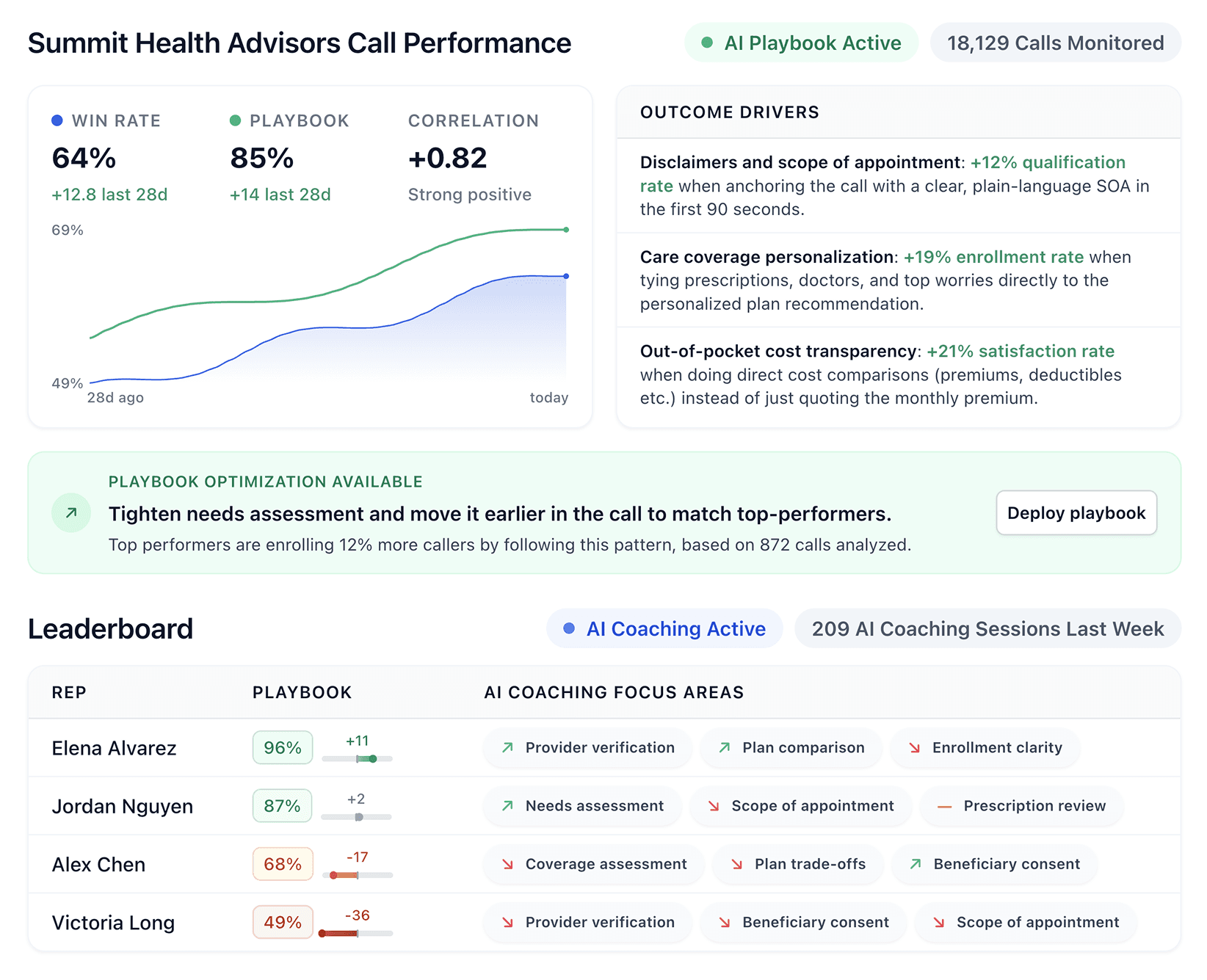
Written by
Eloisa Mae

Reviewed by
Henry Dornier
Published on
Nov 11, 2025
The best follow call center quality assurance best practices, reviewing every interaction, coaching in real time, and seeing results that last. Here’s your step-by-step guide to making that shift:
15 call center quality assurance best practices
Strong quality assurance improves every interaction, helps agents grow, and drives more revenue.
These 15 tips show how to build a QA program that helps your team work better, close more deals, and grow your business:
1. Set goals people care about
Metrics only help if your team understands why they matter. Instead of just tracking numbers, connect them to real outcomes.
Close rate means more commission checks. Average deal size means bigger payouts. When agents see the purpose behind each goal, they care more about hitting it.
Keep it simple. Five clear goals everyone understands are better than twenty that confuse people.
2. Don’t rely on random call samples
Listening to only a few calls each month doesn't show the full story. Agents handle hundreds of conversations that often go unseen.
Use tools like Alpharun that review every call to get a clear picture of how your team sells and where deals fall apart. The goal is to find patterns and understand what can be improved.
3. Treat top agents like teachers
Your best agents already know what works. Instead of keeping their skills a secret, study their calls together.
Ask: What tone do they use when handling objections? How do they position pricing? What makes them sound confident during the close?
Turn those discoveries into a short guide your whole team can use. It's like turning your best reps into coaches. Alpharun helps teams do this automatically by analyzing real calls and turning them into learning moments that build lasting habits.
4. Give feedback while it still matters
Waiting weeks to discuss a call doesn't help. People forget what they said or why.
Give feedback soon after the call if you can. A short note like "You built great rapport in the first three minutes. Next time, try transitioning to pricing sooner" is more effective than a scorecard later.
The faster you give feedback, the faster your team improves.
5. Focus on the words that change outcomes
Small word choices can make a big difference. Instead of saying "The price is $500," try "Your investment is $500."
Use call reviews to find the exact sentences that close deals or lose them. When agents can see and hear those moments, the learning feels real.
Sentence-level feedback also helps managers find patterns, such as how tone or pacing affects prospect engagement.
6. Follow the whole sales journey
Quality assurance should not stop at one call. Prospects move through multiple touchpoints, expecting a smooth experience each time.
Review the full sales journey. Check if one agent qualified a lead properly before passing it. Check if another lost momentum by repeating discovery questions.
Seeing the whole story helps your QA team find and fix gaps that kill deals and waste opportunities.
7. Let technology protect compliance
Compliance is about trust. Prospects want to know their data and conversations are safe, especially in regulated industries like insurance and healthcare.
Instead of relying on people to catch every mistake, use tools that help in real time. If an agent forgets a required disclosure or says something off-script, the system can give a quick alert.
This keeps your company safe and teaches agents what to do right away, so they learn before small mistakes grow into big ones.
8. Combine all prospect feedback
Prospects often tell you what needs fixing if you listen in the right places. Calls, emails, surveys, and lost deal reviews all give clues about their experience.
When you connect QA data with prospect feedback, you see the full picture. A call might sound fine to your team, but a follow-up survey could show the prospect felt rushed or confused.
Use what you learn to update your QA checklist so it matches what actually drives conversions.
9. Make progress easy to see
People like to know how they are doing. Share QA results in a simple and fair way that everyone can understand.
Create team dashboards that show wins and improvements. Celebrate progress and effort instead of chasing perfection.
When people see their growth, they feel proud of their work, and that pride leads to better performance.
10. Let agents help create the standards
When agents help set the rules, they believe in them. Ask your team what quality means to them and what makes a call successful.
This builds better standards and stronger teamwork. QA becomes something the team takes part in, not something that feels forced on them.
When everyone helps define success, feedback feels fair and easier to accept.
11. Let agents review their own calls
People learn a lot when they review their own work. Give agents time to listen to their calls and rate themselves.
Ask questions like “What went well?” and “What could you do differently next time?” Then compare their answers with the QA team’s notes.
This opens real conversations and helps agents understand their strengths and areas for growth.
12. Fix the root cause
When many agents make the same mistake, the issue often comes from the process or system.
Look closely to find what’s wrong. The script could be unclear, the software could slow people down, or the training could skip an important step.
Using insights from call center quality assurance best practices helps you spot these patterns early. QA data shows where problems start so you can fix the root cause for everyone.
13. Balance feedback with praise
Too much criticism can lower motivation. People also need to hear what they are doing right.
Use QA to highlight great moments, such as when an agent handles a pricing objection smoothly or closes confidently after building rapport.
Give specific praise like "You stayed patient through three objections and closed anyway." Positive feedback teaches just as much as correction.
14. Review your QA system too
QA teams need feedback just like everyone else. Check your process often to make sure it is fair, clear, and useful.
Ask questions such as "Do our scores predict actual sales results?" and "Are reviewers consistent?"
When you improve your QA system, your whole operation becomes stronger.
15. Connect quality to real results
Quality scores only matter when they lead to real improvements.
Link QA data to outcomes like higher close rates, more renewals, or bigger deal sizes. When agents see that quality affects their commission, they understand why it matters.
Connecting quality to real success helps build a culture where everyone aims to do their best work.
What is call center quality assurance?
Call center quality assurance means checking how well agents handle sales calls and finding ways to improve. It works by reviewing conversations, scoring performance, and giving feedback so every prospect gets the same quality experience.
In the old setup, supervisors listened to just a few calls per agent each month. That slow process missed most interactions and delayed coaching.
Modern QA uses AI to review every call in real time. It spots patterns, flags issues fast, and gives agents instant feedback to improve right away.
Why quality assurance matters for call centers
When sales teams get the right support, performance improves fast. In fact, sales coaching boosts productivity by 88%, compared to just 23% from training alone.
Quality assurance turns that coaching into a system. It helps every agent learn what your top performers do right and reach that same high level.
QA improves sales conversion by showing exactly where each rep excels and where they lose deals, helping them build confidence and close more opportunities.
It increases revenue per agent by catching sales gaps early and fixing them before they become patterns, leading to higher average deal values.
It accelerates time to quota by targeting real skill gaps instead of guessing what agents need, making coaching more effective.
And it increases manager efficiency by focusing time on high-impact coaching and uncovering patterns that affect the whole team.
The future of call center quality assurance
Quality assurance is moving from random call checks to continuous, data-driven insight. AI now listens to every interaction and learns what makes conversations convert.
The strongest QA programs use that data to build custom playbooks based on real performance. They coach agents in real time and spot trends that humans might never notice.
Old QA asked, "Did the agent follow the process?"
Modern QA asks, "Which processes actually close deals?"
The goal is to move from basic compliance to steady revenue growth.
Here’s what’s shaping the future of QA:
Predictive analytics that forecast performance before issues happen
Automated coaching that adjusts to how each agent learns
Cross-channel tracking that connects calls, emails, and follow-ups
Revenue attribution analysis that ties quality directly to closed deals
Teams that adopt modern call center quality assurance best practices see faster growth. More agents reach quota. Coaching becomes scalable, and training costs drop as performance rises.
The smarter way to build a high-performing sales team
Dashboards show numbers. Alpharun shows what actually drives those numbers.
It listens to every call, learns from your best reps, and turns that knowledge into a live playbook your entire team can follow.
Each call gets scored automatically, and agents get sentence-level feedback they can use right away. Managers see progress in real time and know exactly where to focus coaching.
With Alpharun, you’ll see:
Private, protected data that meets SOC 2 Type 2, GDPR, and HIPAA standards
Coaching that sticks by pointing to the exact words or moments that need attention
Dashboards that matter with clear rollups by rep and team
Performance that compounds over time, raising the floor for everyone
Because Alpharun is playbook-driven, its AI models learn your unique sales and compliance practices instead of using generic patterns. It helps teams go beyond traditional call center quality assurance best practices by using real performance data to guide every improvement.
And with AI voice agents for repetitive tasks like scheduling and lead capture, your reps can focus on conversations that matter most.
Alpharun helps your whole team perform at their best, every time. That’s how extraordinary performance becomes the norm. Get started with a demo today.



